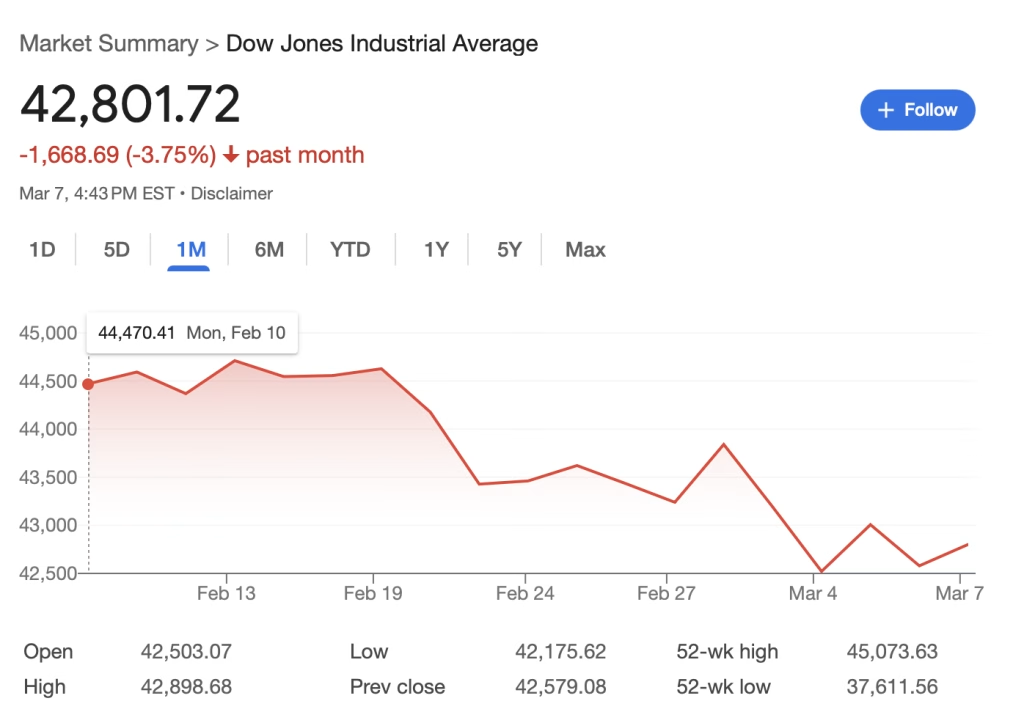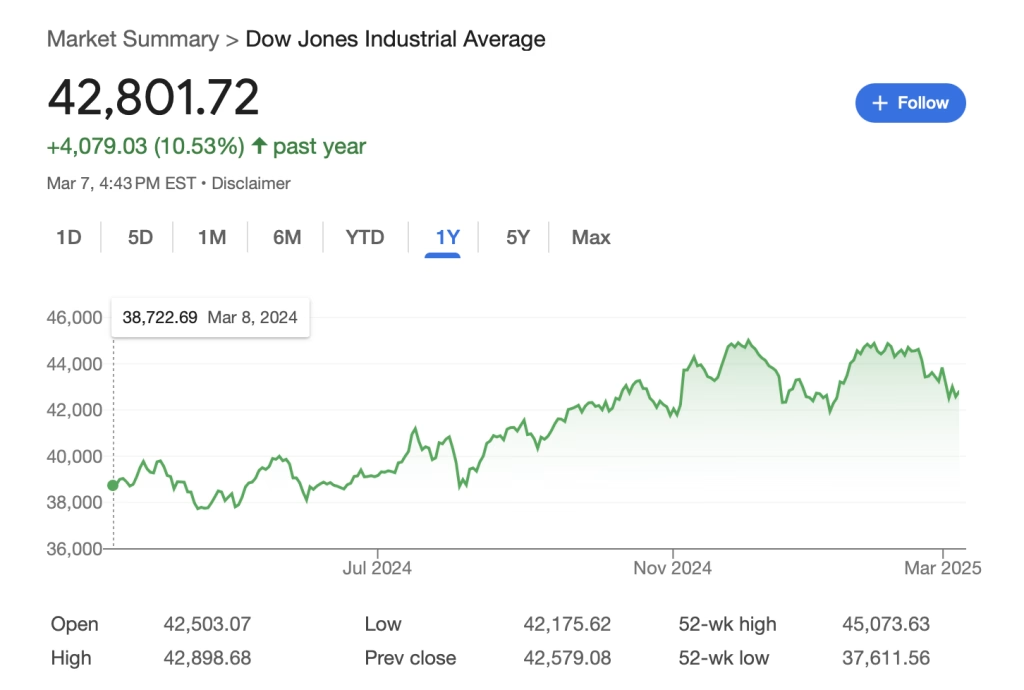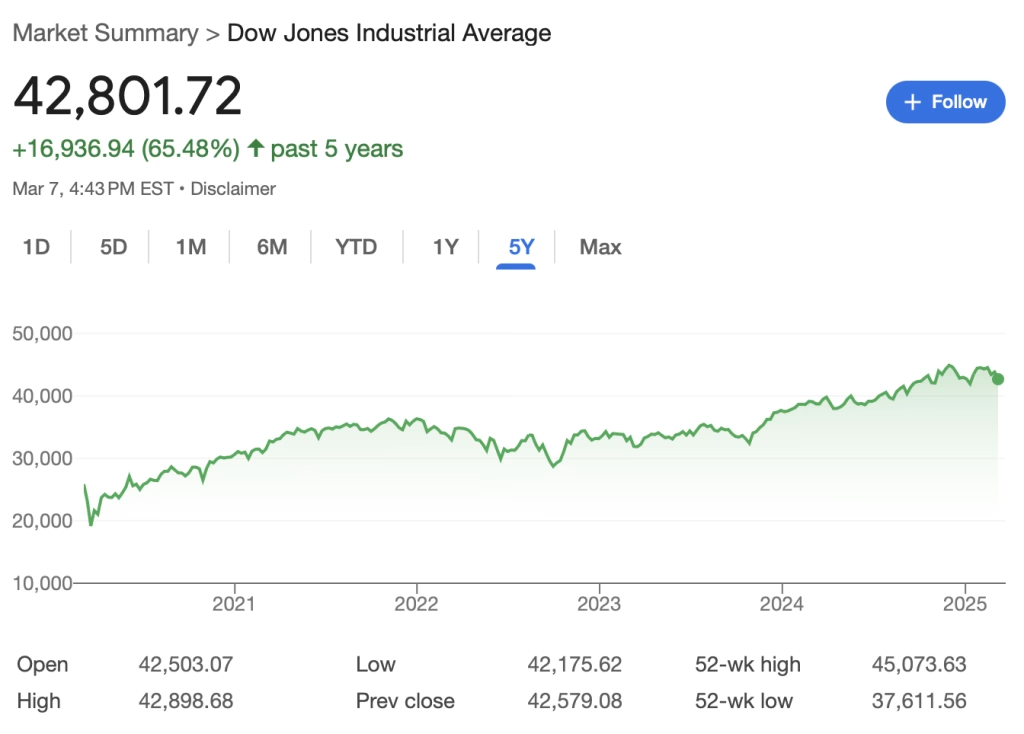Two DJIA Charts
And thoughts about Trump's economic approach to date.

I know that the DJIA is not the economy, writ large, but I also know that it matters to a lot of people, and that it also provides at least one set of inputs from the broader economy. I also know that that politicians do like to note when stocks are strong and going upward, and when they are.
I will also caveat that a month’s worth of data is not a lot, but I would note the following. Trump, who keeps talking about Golden Ages and promised a magically delicious economy on the campaign trail, has been in office a month and change. Here’s the DJIA over the last month. I would note that the most signficant inputs into economic policy over this period of time have been one again/off again/on again/off again tariffs, lots of people losing their jobs (and by policy choice), and an increase in global instability due to Trump’s attacks on the basic global order. I would throw in a generally chaotic approach to government.

For kicks, here’s the DJIA for the last 12 months, 11 of which were under Biden.

But the current occupant of the White House told us the following this week:
Common sense has become a common theme, and we will never go back, never — ever going to let that happen. Among my very highest priorities is to rescue our economy and get dramatic and immediate relief to working families. As you know, we inherited from the last administration an economic catastrophe and an inflation nightmare.
He can try and create whatever unreality he wants, but the portfolios will speak for themselves.
The crazy thing is that I thought the incoming administration would do very little and then claim credit for the economy they had inherited. Instead, they appear to want to lie about what they inherited and then go about creating a new mess.
Please note what I am saying and not saying.
I thoroughly understand that the president does not control the DJIA. I also fully recognize that normally whatever was happening in the economy at this stage would mostly be follow-on from the previous administration. Indeed, to pick something very specific, I do not think that egg prices are at all linked to Trump policies (of course, they weren’t linked to Biden’s, either). The problem with avian flu started before Trump came to office and has accelerated since his election. That’s not his fault.
However, as noted above, he has engaged in a number of moves that are directly disruptive of the national (and global) economy. And the economy is reacting to those moves. It is not a coincidence (despite the cries of some) that the market takes a dive when Trump plays his tariff games.
Maybe it all gets corrected, but the administration is not making me confident, shall we say.
Indeed, as the AP notes, US economic worries mount as Trump implements tariffs, cuts workforce and freezes spending.
Since January, the economic policy uncertainty index has spiked 41% to a level, 334.5, that in the past signaled a recession. Nicholas Bloom, a Stanford University economist and co-developer of the uncertainty index, said it’s unclear how this will play out, but he’s worried.
“I have an increasing fear we will enter into what may become known as the ‘Trump recession,’” he said. “Ongoing policy turbulence and a tariff war could tip the U.S. economy into its first recession in five years.” That last recession occurred under Trump because of the coronavirus pandemic.
I guess we shall see.
Here’s the 5-year look that I initially had mistakenly put in for the 1-year one.

I sold off 90% of my stocks and moved to T-Bills. They pay just enough to cancel inflation, but they’re as safe as anything can be.
I recall a convo I had right here with Drew/Guarneri/Jack/Connor on the subject of drill baby, drill. I said I doubted there would be a rush to drill as a lot of leases are not even active and the price of oil is gradually declining as green energies and more energy efficiency come into play. To which Drew/Guarneri/Jack/Connor replied, Bwah hah hah, dumb-ass.
In 2000 oil was 39% of global energy production, and that figure is now around 32%. Maybe a smaller piece of a bigger pie, but since that conversation took place, a basket of oil-drilling stocks has dropped 26%. The broader oil stock market is down about 5% since that time.
Trump’s own stock, if I’m kind and set aside the rapidly-disappearing Trump bump, it’s now $22, down from $35 on election day. (Bonus point: Tesla, dropping like a rock, the entire Trump bump is gone.)
Bear this in mind next time Drew/Guarneri/Jack/Connor tries to pass himself off as a brilliant businessman. He got beat by a kid book writer who literally – not making this up – never reads his statements because they’re just too boring. About twice a year I email my money person and ask, ‘all in, how much we got?’
Volatility is a benefit to the uber-wealthy. When you have cash to burn, you can buy low and sell high, often in the same day.
I am retired so I keep a couple of years in cash so that I’m not forced to sell during a Trump tantrum, and I can wait for the inevitable walk-back, but lots of people are very emotional about their investments and don’t have the constitution to wait out a market drop.
You all wanna be really freaked out?
https://paulkrugman.substack.com/p/tariffs-tariffs-tariffs-in-conversation?utm_source=post-email-title&publication_id=277517&post_id=158621197&utm_campaign=email-post-title&isFreemail=true&r=2j541o&triedRedirect=true&utm_medium=email
Couple of things the morons won’t understand (and that I hate that I understand on a first pass)
These are the things that will take weeks or months to show up, especially in the DJIA. All the idiots crowing now will be eating shit when these companies are force to realize their asset losses. I don’t understand accounting at all, but I do know that you are eventually forced to take your losses. So many of these rich CEO types have been blinded by the massive stroking they’ve received over the last 40 years. I will cheer when they start raining down on the streets. Morons from heaven.
@Michael Reynolds:
I’m starting to think that when you and I are in full agreement, that means the bad shit is here. People that either haven’t reckoned with, or didn’t have intensely traumatic pasts don’t have the spidey sense you get from the unconscious knowledge that your parents could kill you at anytime. Mine’s screaming.
Selling the lie that the economy was a catastrophe under the Biden administration, makes follow-on from the previous administration untenable. And Trump certainly leaned into the false notion that the president controls the economy, because his Trump Will Fix It pitch depended on it.
The show must go on. The question isn’t what Trump will do with economic trends in or out of his control. The question is how long people who bought the lie back in November will continue to buy the lie.
Herbert Hoover got 40% of the vote in 1932 v. FDR.
75% of voters who voted Hoover in 1928 also voted Hoover in 1932.
It takes massive bad news to get people’s attention. Really severe economic damage is the only thing that might discredit Trump/GOP sufficiently to adequately arrest the present trend to Orban/Putin style authoritarianism. So I am not exactly dismayed by all this.
@charontwo:
I agree with your basic point. What I’m wrestling with is that a lot of people will die or suffer horribly from this. To not be dismayed feels wrong. But at the same time, I can’t help but feel that I want so many of these idiots to suffer horribly before they die.
I think this makes me a fundamentally bad person.
@Michael Reynolds:
Trump has already suggested that some parts of the national debt may not be real. If this is more than loose talk to circumvent the debt ceiling, T-bills may soon not be worth much.
@charontwo:
Here’s another unpleasant thought. How much of Orban’s authoritarianism is possible because he has (had?) the EU and US to back stop him?
Or do the authoritarians simply don’t care so long as they can rule over the shit heap?
@drj:
Funding runs out on Friday and I’m not hearing much about the looming government shutdown. Am I just missing it? I mean, I think I know why: the GOP wants to shut it down cause they think they will be the ones to rule the shit heap.
Nevermind. Johnson apparently thinks he’s got the special sauce and Trump is out there threatening the weirdos. Apparently Chip Roy has a hard-on about this and is giddy. Seems like a bad sign.
@Beth:
Put this in perspective by considering the price Ukrainians are showing themselves ready to pay to defend their freedom.
As the song would have it “you don’t know what you’ve got till it’s gone.”
People here are too accustomed to taking the results of stable functional government for granted, they need to learn.
So many maroons are convinced Trump really cares about them, really values them. These are people who desperately need to encounter objective reality.
Yes, I am concerned that it will probably take a lot of suffering to change people’s minds, too. I’m more resigned to that than feeling guilty, though. I’m not in control of them, after all. I, ahem, have been in much closer contact with people doing things that are very bad for them. That was very challenging, but I did learn how to separate certain things.
I think the impulse to see the foolish people suffer is pretty human. I would encourage you to sharpen your focus too. Don’t get so caught up with the woman who voted for Trump because she saw on TikTok that he would make IVF free. (And there are a lot of people like that.) Instead, ask yourself why there aren’t people making a Democratic case on TikTok (in spots that are fun, and don’t last more than 30 seconds.)
First, want to point out that the second chart is for 5 years, not just the last year under Biden.
Second, as a strong proponent and protester for #TeslaTakedown it has been EXTREMELY gratifying to see TSLA down nearly 50% since its peak after the election.
Third, what is killing the DJIA and the market generally is the Fear, Uncertainty and Doubt being dished out by Trump/Musk. The Economic Policy Uncertainty Index has hit its highest level ever…higher than COVID, higher than the Great Recession. https://www.policyuncertainty.com
That is killing the confidence of almost everyone to invest and plan. Hard to grow one’s business when afraid of what’s to come tomorrow.
@charontwo:
As Dr. Taylor and Leonard Bernstein tell us, “When you’re a GOP you’re a GOP all the way, from your first cigarette to your last dying day.” Yes, the faithful will remain faithful to Trump through anything. I don’t know why we spend money on fusion research (Are we this week?) when motivated reasoning is plentiful and the most powerful force in the world.
@James R Ehrler: Ugh. I screenshot the wrong chart. Will fix.
@Michael Reynolds:
I’m retired and in 2024, with Trump back in play and leading in polls, I figured that if Trump won, chaos and volatility was going to be the rule not the exception. So, I moved 2/3rds of my market holdings over to insured CDs and my passive income yield is about 5%. I am doing fine.
Many years ago an economics professor (my undergrad advisor) who specialized in finance and real estate economics told me that a person should be invested in whatever allows that person to sleep soundly at night. He said if you’re constantly worrying about your investments, then change your investments to what worries you less, accept less risk. And so I moved in the direction of less risk.
Whoa. Your comments are so caveated I’m not sure what you are really trying to do. And that “analysis” would get you thrown out of an investments class.
You probably should consider the following two graphs on the index, and valuation multiple multiples.
https://wallstreetnumbers.com/indexes/dji/price
https://www.currentmarketvaluation.com/models/price-earnings.php#:~:text=The%20P%2FE%20ratio%20is%20a%20classic%20measure%20of,The%20current%20S%26P500%2010-year%20P%2FE%20Ratio%20is%2036.8.
They speak for themselves, but just a couple observations. The index rises and falls rather precipitously within and between administrations. You noted it – a month ain’t nuthin,’ but really, years are more like it. Second, it is obvious that for quite some time easy credit ruled the day, it being the denominator in any discounted cash flow analysis. (And got us a 20% increase in the goods and services price level.) Finally, the index really is poorly constructed right now, driven by a handful of astronomically priced equities. It makes real analysis of valuations of traditional equities vs high flyers difficult.
That all said, I do agree with you that tariffs on/tariffs off creates uncertainty, and markets don’t like that. I think a more stable posture would help. The counter is that no one except for a handful of administration insiders know how much the tariff issue is negotiating. But let’s not ignore a simple fact, the mercantilist policies of Canada, the EU and China need redress. China is a well worn topic, but Germany is export driven and follows a beggar-thy-neighbor policy without much (any?) comment about them starting trade wars. etc etc It will take 6 months for Trumps policies (perhaps with the exception of tariffs) to really be attributable to the economy.
Talk I have seen here and elsewhere about eggs and such is just nonsense.
@Beth:
No, @Beth, the fact that you struggle with this proves you are, in fact, a much better person than Luddite. Luddite’s more than willing to stand there watching them burn.
This is why you don’t want Luddite in a position of power. Ever.
@Beth:
I have a sneaking suspicion that Orban is quite soon going to get a sharp lesson in relative power.
The EU has been, as it’s nature, extremely legalistic in respecting Hungary’s right to veto, and to continue receiving EU funding on a rather large scale.
However, the nature of the game has now changed: Orban is now playing silly buggers with existential issues.
And is too stupid and arrogant to realise the possible consequences: the autocrat disease.
“Of course all things shall be as you wish, dear leader!”
When things become existential, legal constraints often hold up about as well as an ice cube in the desert at noon.
“Talk I have seen here and elsewhere about eggs and such is just nonsense.”
So sensitive! It didnt seem to offend you when your fellow MAGA peeps were making claims about eggs. Anyway, its too early to draw real conclusions yet other than that markets dont seem to like the uncertainty of on-off-on-off on policy and I suspect many investors will eat to see how the courts rule on the legality of the impoundment issue, among others. Also, there are likely a lot fo lawsuits coming up with the govt unilaterally breaking contracts.
Steve
On the subject of the US economy in general:
US prosperity since WW2 has owed a good deal to the general post-1945 and post-1990 global trading and financial system.
Some are inclined to look at the relative decline in US manufacturing and conclude: “It’s harmed us”
Without stopping to think about what the benefits have been.
A autarkic manufacturing economy of the 1950’s might be achievable; but perhaps at the cost of 1950’s per capita living standards. Modified by the much reduced need for unskilled labour of modern industry.
That’s the general picture.
More specifically, screwing up global trade is also likely to have currently uncertain but likely unpleasant consequences for US exports, for the costs of imports, for the dollar, for US overseas investments, for the US position in global finance, etc etc.
The MAGA reaction to such critiques usually defaults to “globalist elites”; which is amusing.
How often MAGA talking points are actually a weird variant on those of the radical Left of the last 50 years.
It will be interesting to see how long that gets sustained when the likely inflationary crunch arrives, and the market/Fed reaction hikes interest rates, initiates recession, and may even wreck the US capacity for deficit finance.
Which the current administration/Congress continue to rely upon for their massive expenditure PLUS tax cuts agenda.
Sometimes economic and financial reality interrupt fantasy with about the same subtlety as a 2×4 upside the head.
The bright spot in the stock market downturn is that Tesla and Trump Media shares have slumped way more than the DJIA. And they still have plenty of room left to go even lower!
@Connor: The point is pretty straightforward, and in your heart of hearts, you know what it is, Mr. Business Genius.
You know full well that if Harris had won or if Trump had just done nothing, the market would almost certainly be performing better than it has over the last month.
You know that the tarriffs and the uncertaintly are affecting things, but you don’t want to admit that the “pro-business” candidate you voted for, support, and defend, is screwing up the business environment.
It is just all so stupid, and you can’t admit it. I just don’t have the patience to be less blunt.
@al Ameda:
We’re getting close to retirement and my husband was laid off. We looked at our 401(k) balance and the site has a tool that automatically analyzes your portfolio. It said “You are invested too conservatively.” But I am wondering if we should go even more conservative. I feel like that money is all that stands between us and homelessness. “Too conservative” is probably about right, although “Much too conservative” may be better for my peace of mind.
@Steven L. Taylor: The point is pretty straightforward, and in your heart of hearts, you know what it is, [Connor]. . . . . It is just all so stupid, and you can’t admit it. I just don’t have the patience to be less blunt.”
Thank you, Steven. 🙂
@Kari Q:
Does the tool used take into account the fact that you’re near retirement (age, etc) ? There are many things to consider and a primary basis is: how much income do you need in retirement? That will lead you to what type of investments will meet your need with respect to the level risk you’re willing to live with.
I wish you well.
Trump is doing what narcissistic abusers do: creating a mess and then demanding credit for fixing the mess they created.
@al Ameda:
I think it does. I’d have to double check and I don’t feel like doing that. It recommends an allocation of at least 60% stocks till retirement, and that’s more risk than I can stomach right now. Even when he finds a job (which I am sure he will) the idea of putting money in the stock market makes me a bit queasy.
@Kari Q: Time in the market beats timing the market.
I did this analysis a few years ago, but basically in the entire history of the stock market, here are the worst possible outcomes:
Holding Time –> Worst Average Annual Return in history
5-years –> -5.14% (1936-1941)
10-years –> 0.67% (1998-2008)
20-years –> 7.24% (1925-1945)
If you have the 20 years to hold assets, an S&P 500 index fund, or similar, should produce a decent, positive return as long as you are able to hold the position that long.
One of my favorite retirement planning websites is http://firecalc.com. It’s a Monte-Carlo analysis of outcomes over the history of the market, allowing you to change investment percentages and other bits and bobs to see how it would have gone at any point in history.
Data has given me the confidence to retire very young and to not panic when things are temporarily bad. I remain confident that the United States, for all of its flaws, still cares deeply about investors, capitalists, and money in general.
@Tony W: While I understand and basically agree with this, as someone who is now retired (along with my wife) we have transitioned post election, pre inauguration from 80% stock to 80% cash (before the latest travails, thank goodness).
The problem with holding 60% in stock as one nears retirement is two fold, IMHO. First, while you may get potential upside, you can’t sleep at night. Very important!
Second, the historical record reflects a situation where there was congressional action required for most economic changes. Yes tariffs and immigration policy were theoretically solely the province of the president, but the feelings/input of congress and the public were absolutely reflected in what action was taken or allowed to continue.
With Trump that is no longer the case. He turns on and off tariffs on a whim and, while his deportation policies are a bit harder to act upon, the elimination of protected status for many groups is a real time indication of where he wants to go.
In addition he has Fox News, X, and the other parts of the right wing information machine to provide cover and delay any congressional or voter reaction to his actions, allowing them to create chaos deeper in the economy than one would normally expect.
So, as I said, given this we took the (for us) unprecedented step of massively changing our investment risk profile. Tariffs will raise inflation, create chaos and, in the end, put a stop to the Fed cutting rates. Sending CBP after ag workers in the fields/meat plants along with construction workers will raise the cost of both food and shelter. Again, forcing the Fed to stop rate cutting and increasing the odds of a recession.
To sum up, we believe this is a sui generis moment and that the risks of being in the market during this rogue administration way out weigh the potential upside loss. YMMV.
@gVOR10: I would say Sondheim, not Bernstein.
That is all.
@Michael Reynolds:
I’m moving a big chunk of my money into ISHG (1-3 year treasuries from non-US developed countries) because I don’t really trust the current administration not to default on US treasuries
@Tony W:
Aye, there’s the rub. Planned on retiring in a few years, one income gone, and a president courting economic hardship. Do I have 20 years before I need the money? I honestly don’t know.
@James R Ehrler: Everything is unprecedented. The Depression. WWI and WWII, Polio. The civil rights era. Nixon’s resignation. The oil embargo and gas lines. The 2008 recession. And so on. All huge things that “changed things forever.”
I’m not changing my investing philosophy, which came about over 30 years and takes the above (and more) into account, based on current events.
Trump just wants to rob the treasury, that’s his main goal and Elon is showing him how to do it at scale. Investment returns still matter to the big guys too
@Tony W: All true but what this most reminds me of is the run up to the Great Depression, which, surprise!, was the worst return time frame.
Probably it will all work out over a 10 or 20 year time horizon and, in fact, that is why we are still 20% invested in a S&P index fund (and if I were younger I would agree with your outlook and hang in there at high equity levels) but that is specifically not what Kari Q is looking at.
Edited to add: Having cash that Kari Q can put back in the market during the coming recession etc. does not seem to be a crazy strategy given the current very high market levels and a looming recession. And I say this as someone who has never been a market timer.